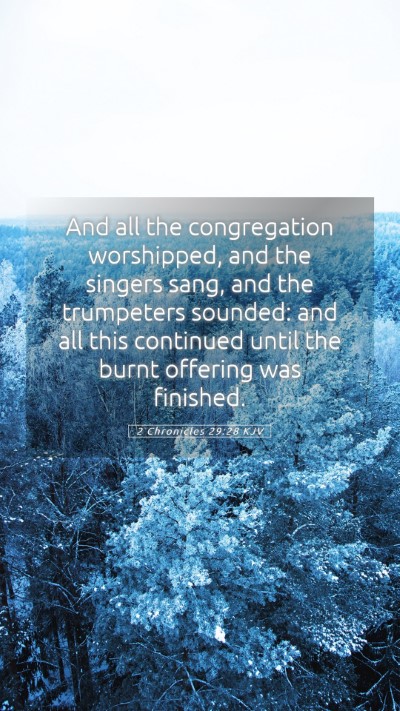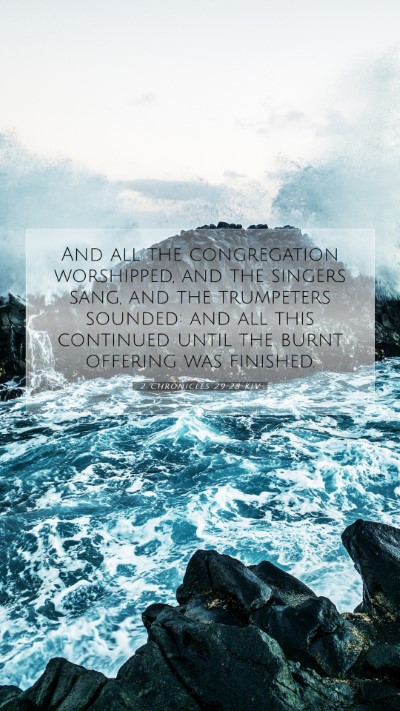Understanding 2 Chronicles 29:28
2 Chronicles 29:28 describes the moment when King Hezekiah initiated a significant religious reform in the Kingdom of Judah. This verse mentions how the people of Judah rejoiced and worshipped during the dedication of the offerings. This event is crucial as it marks a return to proper worship and reverence for God after a period of neglect and idolatry.
Bible Verse Meaning
The meaning of this Bible verse can be comprehensively understood through various public domain commentaries. Here are key insights:
- Matthew Henry's Commentary:
According to Henry, the gathering of the people and their rejoicing signifies a collective return to faith, reflecting not only their relief from previous hardships but also their joy in worship. It emphasizes the importance of communal worship as a source of revival.
- Albert Barnes' Notes:
Barnes points out that this verse illustrates the organized worship attributed to King Hezekiah's reforms. The levitical priests played a vital role, and the event serves as a reminder of the necessity of a proper priestly order in leading God's people into worship.
- Adam Clarke's Commentary:
Clarke notes that the public offering and accompanying worship was significant in reinstating the covenant relationship between God and His people. It represents a pivotal moment in the restoration of Judah's spiritual identity and practice.
Bible Verse Interpretations
This verse allows for various interpretations based on its historical and spiritual context:
- Historical Context: This event occurs after the destructive reign of King Ahaz, who led Judah away from the worship of God. Hezekiah's ascension to the throne initiated a reform that aimed to restore worship practices.
- Spiritual Significance: The rejoicing of the people is a representation of spiritual renewal and collective repentance, highlighting the community's role in worship.
Bible Verse Explanations
To further elaborate, the verse reveals the essence of worship and community in the life of believers:
- Role of Worship: Worship is not only an individual act but a communal expression that brings God’s people together in purpose and joy.
- Invitation to Collective Repentance: Just as Judah returned to God, individuals today are called to examine their lives and worship habits in light of Scripture.
Bible Study Insights
Analyzing 2 Chronicles 29:28 within a Bible study setting can yield various insights:
- Understanding the significance of Hezekiah's reforms can encourage modern believers to prioritize their relationship with God.
- Engagement in corporate worship can revitalize communities of faith today, much like it did in ancient Judah.
- This verse could spark discussions on the roles of leaders and congregations in facilitating worship, both historically and in contemporary settings.
Cross References
2 Chronicles 29:28 can be related to several other verses that emphasize worship and the return to God's ways:
- 2 Kings 18:1-6 - Details the reign of Hezekiah and his commitment to God.
- 2 Chronicles 30:1-5 - Chronicles Hezekiah’s continued efforts to bring God's people together in worship.
- Psalm 150:1-6 - Emphasizes the importance of praising God in community.
Conclusion
In conclusion, 2 Chronicles 29:28 serves as a poignant reminder of the power of communal worship and the joy of returning to God. This insightful exploration using various Bible commentaries provides deeper understanding and relevance for modern believers.
Additional Resources
For those diving deeper into Scripture analysis and biblical exegesis, consider utilizing:
- Bible study guides that focus on Old Testament themes.
- Online Bible study platforms that encourage discussion and collective learning.
- Bible study materials that examine the historical context of events in Scripture.


